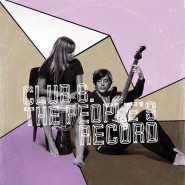 Club 8
Club 8The People's Record
Score: 78
Club 8, Swedish genre-melding band, has made their way from simple indie pop, to bossa nova, to trip hop. Their newest and 7th album, The People’s Record incorporates Afro-pop beats with their indie leanings, all in all making for an extremely interesting and engaging sound. There are some failures on the album, including a sometimes lacking mixing job, but The People’s Record as a whole remains quite strong.
The majority of The People’s Record uses upbeat, active lines that immediately capture the listener’s attention. Their deviation from pure Afro-pop remains purely within the somehow fitting electric guitar and keyboards. Their only flaws are that they often end up sounding quite similar (the entire first half of the second track sounds like the first, but in a different key, and with a different mixing job) and that they often bury the relatively light vocals in their dense sound. So as amazing as tracks like “Western Hospitality” may be, it’s with great pleasure that we welcome tracks like “Dancing with the Mentally Ill.” That track in particular twists the sound that normally engulfs the album, subtly changing the particular instruments, reducing the overall density severely, and changing some of the harmonies. The result is a significantly darker sound that both still resembles the more common, entirely major tracks, as well as a significantly more interesting track (given how unique it is, even just on the album).
Perhaps one of the most interesting things that Club 8 does is to carefully mix electronic effects and acoustic leanings. Ignoring the electric guitar, synth, and voice, which is more often than not imbued with various effects, the more acoustic sounds on the album are, on occasion, subjected to some one effect or another, which invariably works extremely interestingly. The border between electronic and acoustic seems to be Club 8’s favorite location, and they work with it extremely well.
Lead singer Karolina Komstedt’s vocals ring out through The People’s Record, giving Club 8’s already strong instrumentals an equally rich voice. Komstedt’s voice skillfully crafts the all-encompassing spheres of sound that, on tracks like “The People Speak,” spin around Club 8’s energetic sound. Each of the variety of ways in which The People’s Record handles Komstedt’s vocals, from her normal singing, which drives the album while incorporating the emotional weight of her voice into the body of the music, to the cries of “Ha!” which introduce “Isn’t That Great,” adds to the album in its own way. Komstedt’s voice is occasionally swallowed up into the body of the music as a whole, which unfortunately limits her effect on the music slightly, but this is a small flaw - and one’s that largely countered by those sections where the two elements mesh well.
The energy running through The People’s Record gives the album an immediate sense of cheerfulness - which is somewhat contradicted by track titles such as “My Pessimistic Heart” and “We’re All Going to Die.” But titular fatalism and pessimism aside, The People’s Record manages to keep its activity prominent throughout, whether Komstedt is singing about “dancing with the mentally ill” or a “quiet wind at sea.” Repetition is quite common throughout the album and is occasionally overdone, but fortunately it tends to work well with the music as a whole, itself somewhat repetitive.
The People’s Record is certainly a compelling album. Club 8’s combination of indie and African music, while not quite unique in rock, is executed in an original enough fashion to be truly interesting. It certainly doesn’t hurt that each element of this combination and of Club 8’s music as a whole is generally quite well thought out and creative. Unfortunately, The People’s Record suffers from repetition in several sections, most notably instrumentals and lyrics. But the innovation surrounding the album helps to offset this substantially, and all in all, The People’s Record is, though not perfect, a very good album.